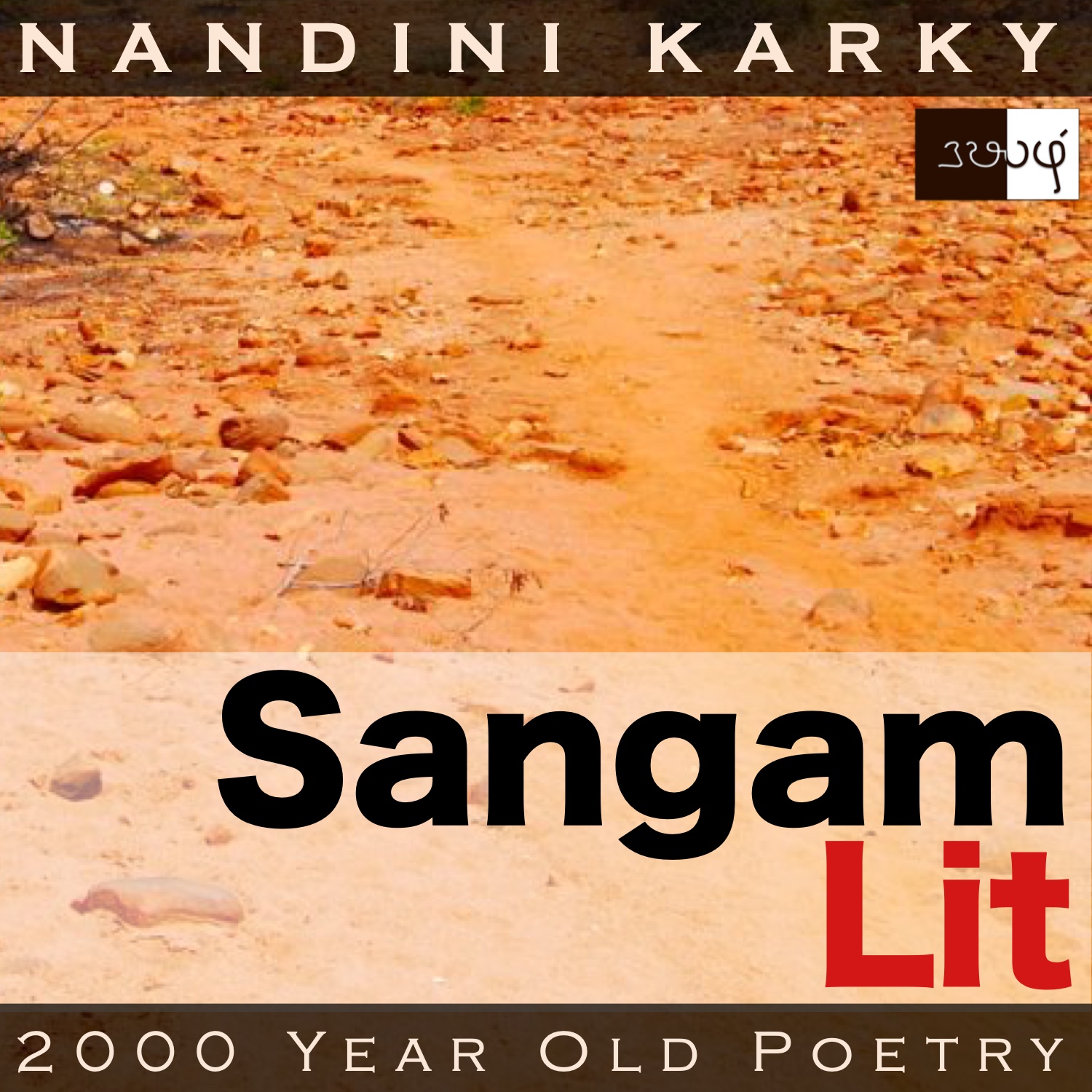Podcast: Play in new window | Download
Subscribe: Apple Podcasts | Spotify | Amazon Music | Android | iHeartRadio | TuneIn | RSS | More

In this episode, we perceive abstract observations on love and death, as portrayed in Sangam Literary work, Natrinai 397, penned by Ammoovanaar. Set in the drylands of ‘Paalai’, the verse speaks in the voice of the lady to the confidante, expressing in a unique manner how she will bear with the man’s separation.
தோளும் அழியும், நாளும் சென்றென;
நீள் இடை அத்தம் நோக்கி, வாள் அற்றுக்
கண்ணும் காட்சி தௌவின; என் நீத்து
அறிவும் மயங்கி, பிறிது ஆகின்றே;
நோயும் பெருகும் மாலையும் வந்தன்று;
யாங்கு ஆகுவென்கொல் யானே? ஈங்கோ
சாதல் அஞ்சேன்; அஞ்சுவல், ‘சாவின்
பிறப்புப் பிறிது ஆகுவதுஆயின்,
மறக்குவேன்கொல், என் காதலன்’ எனவே.
Opening with the words ‘தோளும் அழியும்’ meaning ‘the arms are ruined’, the verse highlights the quintessential symptom of pining in the Sangam age. The phrase ‘நாளும் சென்றென’ talks about ‘the passing of days many’, and connecting with the previous couple of words, it can only mean that it has been days since the man left the lady. Left? Where? These questions are answered by the next set of words ‘நீள் இடை அத்தம்’ meaning ‘the long path towards the drylands’. An insightful observation about a suffering mind can be seen in ‘அறிவும் மயங்கி, பிறிது ஆகின்றே’ meaning ‘my mind is confused and acts as if it’s another’. More about this mind in a while! ‘நோயும் பெருகும் மாலையும் வந்தன்று’ talks about how ‘the evening which accentuates pain is here too’ and reminds one of this exact same thought echoed in many a modern Tamil lyric. Poets over the centuries seem to have sensed that something about the shades of dusk magnifies suffering! ‘சாதல் அஞ்சேன்’ meaning ‘I fear not death’, throbs with dynamism and deep meaning. The verse ends with ‘மறக்குவேன்கொல், என் காதலன், எனவே’ meaning ‘would I forget the one I love?’ and invites us to extend our empathy.
The man and lady had been leading a happy, married life when the man parted away on a mission to gather wealth. He promises the lady that he would return by a certain time. Days pass by and the lady languishes. The confidante is disturbed about the health of the lady and one day, the lady says to her, “Arms have lost their beauty; Days have sped by; Peering at the long drylands path, losing their radiance, eyes too are diminished; Parting from me, the mind is confused, seeming like another; The evening that heightens my affliction has arrived too. What is to become of me? Here, it’s not death I fear. But, I only fear that if I were to die, and if there is another birth, I may forget he, who I love!” With these words, the lady conveys to the confidante that though the circumstances are dire, she has a strong reason to bear with the man’s separation.
Time to delve into the mysteries of the mind! The lady starts by giving a vivid account of her current state. She mentions how her arms have thinned down and lost their beauty. Ironic how in the current age, wherein people struggle to lose weight, the sight of thinning arms would be a joy for many, whereas in this Sangam verse, it heads the list of catastrophes that can happen to a woman! Returning to the verse, the lady then talks about how the days have gone by and probably indicates that the man’s promised time of return is long past. What has the lady been doing all these days? Staring at the long path ahead, which took the man to the drylands, she tells us. This reminds me of a popular Tamil saying, ‘வழி மேல் விழி வைத்து’ talking about how in expectation of a beloved’s return, one’s eyes seem to constantly dart to the entrance. Curious how emotion has a way of breaking the boundaries of time! Our Sangam lady too has been looking at the path, waiting for the man to return. Day after day, when only disappointment meets her, the lady’s eyes start to lose their shine. In addition to the arms and eyes that seem to be losing their health, her mind too seems to part away from her and become another. Here’s an acute understanding of how the mind works when in the midst of suffering. It seems to fracture into many voices, with some pleading rationally and others moving in an emotional direction. The quiet and unified voice within that one is used to hearing in times of normalcy is no more and this is why the lady calls her own mind, a stranger!
To add fuel to the burning fire, the evening hour has arrived to torment me, the lady adds. She then puts forth the question of how she can bear with all these terrible things happening to her. These are the thoughts plying in the mind of her friend and she verbalises them. Addressing the final worry that throbs in the heart of the confidante about whether the lady would lose her health and perish, the lady says that she has no fear for death and she would face it gladly. But, something else makes her afraid and that is if there were to be another birth, then it was possible that she would forget the man, and that’s what she couldn’t bear at all. When she says these words, she’s in fact telling her friend to let go of her worry because the lady would not let things proceed to that impossible state, where she may have to forget her beloved. The verse seems to talk about death and reincarnation but the facet I would like to stress on, is the inherent element of doubt. The verse does not say, ‘when there is another birth’; it says, ‘if there is another birth’; and, in that difference, lies the seed of rationality in ancient thought!




I love this poem ❤️